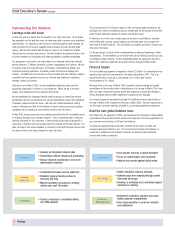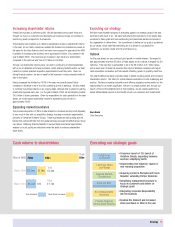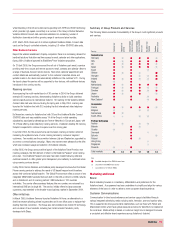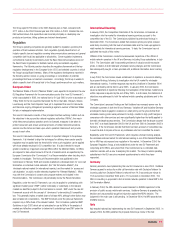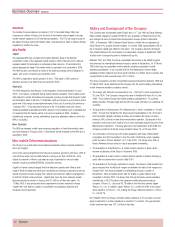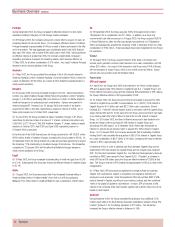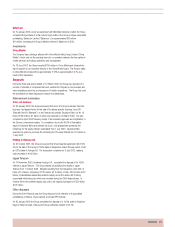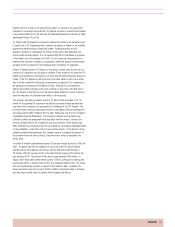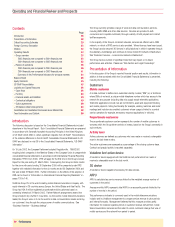Vodafone 2005 Annual Report Download - page 20
Download and view the complete annual report
Please find page 20 of the 2005 Vodafone annual report below. You can navigate through the pages in the report by either clicking on the pages listed below, or by using the keyword search tool below to find specific information within the annual report.
Business Overview continued
18 |Business
Termination Market. The NRA has concluded that all mobile network operators have
SMP and proposes to impose obligations on Vodafone Italy of cost-orientation, non-
discrimination, accounting separation and transparency. The NRA has indicated that it
expects termination charges of about 8.7 eurocents per minute to apply by 2007. In
March 2005, the Italian National Competition Authority (“NCA”) conducted
unannounced inspections of the offices of mobile network operators in Italy including
Vodafone Italy seeking evidence of collusion following complaints by resellers and
potential MVNOs about alleged anti-competitive conduct in the Italian mobile market. If
the NCA decides that there had been a breach of competition law, it would be able to
impose a fine on any operator who had committed the breach.
United Kingdom
The new Communications Act, implementing the new EU Framework and creating a
new NRA for communications, was enacted in July 2003. In December 2003, the
Office of Communications replaced the Office of Telecommunications as the NRA.
The NRA conducted and concluded its review of the wholesale mobile access and call
origination market and found that no operator had SMP. As a result, the existing SMP
obligations on Vodafone UK (including the requirement to offer indirect access) were
removed. On 1 June 2004, the NRA found that all mobile network operators have SMP
in the Call Termination Market and required Vodafone UK to reduce its termination
charge, with effect from September 2004, from approximately 8 pence per minute to a
target average charge of 5.6 pence per minute, representing a 30% reduction.
The NRA has proposed that certain mobile frequencies are to be tradable from 2007.
Other non-mobile frequencies become tradable from 2005. This would allow operators
to transfer rights of use on commercial terms and to change the use to which
frequencies are put, subject to oversight by the NRA. When spectrum becomes
tradable the NRA expects to licence frequencies on broadly equivalent terms, including
a move to a standard 5 year notice of revocation.
The NRA is considering whether holders of spectrum (including 2G mobile operators)
will be able to use their existing spectrum to provide 3G services. The NRA is also
planning a programme of spectrum release over the next 3 years.
The NRA investigated Vodafone’s pricing of certain fixed-to-mobile calls to business
customers and concluded that Vodafone had not infringed competition law.
Other EMEA
Spain
Legislation implementing the new EU Framework was enacted in November 2003. In
October 2004, the Spanish NRA announced a 10.5% reduction in mobile termination
rates, which was implemented by Vodafone Spain in November 2004.
In April 2004, the NCA requested Spanish mobile operators to provide data on SMS
pricing and in September 2004 decided to open a procedure against Vodafone Spain,
Telefónica Móviles and Amena for collusion regarding retail prices applied in providing
SMS and MMS services. This procedure was subsequently closed without action.
Vodafone Spain successfully defended a claim before the NCA of alleged price
squeezing in relation to its pricing of certain fixed-to-mobile calls to business
customers.
Albania
In May 2004, the NRA designated Vodafone Albania as having SMP in the mobile
market which may lead to increased regulation. Vodafone Albania has appealed this
decision. In addition, the NRA has commenced regulation of mobile termination rates
by approving recommended rates for 2004.
Egypt
Egypt enacted a new telecommunications law in 2003 which gave new powers to the
NRA and imposed new obligations on licensees, including obligations in relation to
universal service provision. During 2004, Vodafone Egypt finalised an agreement with
the NRA that covered most of these new obligations while obtaining additional
spectrum in the 1800MHz range to facilitate business expansion. The nature and
extent of the universal service obligations are still pending negotiation with the NRA.
Greece
Greece is expected to enact national law implementing the new EU Framework during
2005. Nevertheless, the Greek NRA has conducted a preliminary review of the Call
Termination Market, has proposed that all mobile network operators have SMP, and
proposed the imposition of obligations of cost-orientation, non-discrimination,
accounting separation and transparency. Vodafone Greece agreed to reduce its mobile
termination rate from approximately 17 eurocents to 14.5 eurocents per minute on
1 October 2004. The NRA is developing a Long Run Incremental Cost model (“LRIC
Model”) to determine cost oriented mobile call termination rates.
In April 2005, the Council of State issued a judgment that base stations erected by
mobile operators prior to August 2002 did not meet legal requirements. This judgment
may result in a requirement for some masts to be removed.
Hungary
Hungary implemented the new EU Framework in January 2004 as part of its
preparations for joining the EU on 1 May 2004. In its review of the Call Termination
Market, the NRA has proposed that all mobile network operators have SMP and has
imposed obligations of cost-orientation, non-discrimination, accounting separation and
transparency. Vodafone Hungary has appealed this finding. The NRA is developing a
LRIC Model to determine cost oriented mobile call termination rates. In its review of
the market for wholesale mobile access and call origination, the NRA found that no
mobile network operator had SMP.
The NRA has concluded a tender process for the award of 3G licences. Licences were
awarded to each of the existing 2G operators, including Vodafone Hungary.
Ireland
Regulations implementing the new EU Framework were adopted in June 2003. In
February 2005, the NRA found that Vodafone and O2have joint SMP in the wholesale
access and call origination market. The NRA has imposed an obligation on both
Vodafone and O2to negotiate wholesale access agreements on reasonable terms, with
powers for the NRA to intervene if necessary. Vodafone and O2are appealing the
NRA’s findings.
In its review of the Call Termination Market, the NRA has found that all mobile network
operators have SMP. The NRA proposes the imposition of obligations of cost-
orientation, non-discrimination, accounting separation and transparency. The NRA is
also considering the use of price controls. In the interim, the NRA expected Vodafone
Ireland and O2to fulfil undertakings made to reduce average mobile termination rates
by 5% and 8% below inflation respectively, calculated by reference to the Irish
consumer prices index. Vodafone Ireland complied with the rate reductions. Further
price controls will be considered by the NRA in 2005.
Malta
Legislation implementing the new EU Framework in Malta was enacted during 2004.
In the Call Termination Market, the NRA proposes to find all mobile network operators
as having SMP and is expected to impose obligations on Vodafone Malta of cost
orientation, non-discrimination, accounting separation and transparency.
The NRA has announced a process to offer three 3G licences in the Maltese market
during 2005.
The Netherlands
The Netherlands implemented the new EU Framework during 2004. In December
2003, mobile network operators reached agreement with the NRA and the NCA to
reduce mobile call termination rates between 1 January 2004 and 1 December 2005.


